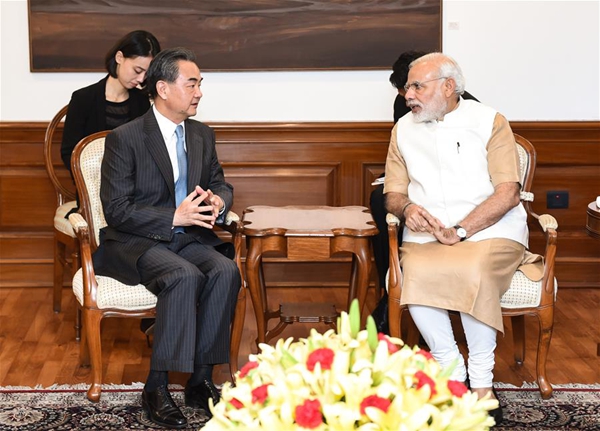India, China revive candid conversation
- By Shastri Ramachandaran in New Delhi
 0 Comment(s)
0 Comment(s) Print
Print E-mail China.org.cn, August 16, 2016
E-mail China.org.cn, August 16, 2016
|
|
|
Indian Prime Minister Narendra Modi (R) meets with Chinese Foreign Minister Wang Yi in New Delhi, India, Aug. 13, 2016. (Xinhua/Bi Xiaoyang) |
Chinese Foreign Minister Wang Yi's three-day visit to India last weekend had a clear and positive outcome. Wang, who met with Indian Prime Minister Narendra Modi and External Affairs Minister Sushma Swaraj in New Delhi, also travelled to Goa, the venue for the BRICS Summit to be held in October.
During his Goa visit on August 12, the very first day of his visit to India, Wang had a warm and productive meeting with Goa Chief Minister Mr. Laxmikant Parsekar.
Beijing has reason to be pleased that New Delhi pulled out the stops to banish the chill induced by recent events - such as the Nuclear Suppliers Group rejecting India's membership bid, the international tribunal's verdict on the South China Sea and the Chamoli "transgression" - and restore an atmosphere for a frank and friendly discussion.
As the Chinese Consul-General in Kolkata Ma Zhanwu told a news agency, Wang's visit shows the maturity of a bilateral relationship. "The shared interests far outweigh the differences. It shows that there is a lot of scope to continue with discussions and dialogues."
Asked about the differences that persist between India and China, Ma said: "Ours is a very important relationship. The differences are not that important. Our relationship is strong and differences are nothing new."
Modi, who received Wang for 20 minutes, was briefed on the G20 Summit to be held in Hangzhou in September. Modi also conveyed his greetings to President Xi Jinping.
According to official sources in the Ministry of External Affairs, Wang had a three-hour discussion with Swaraj. The discussion focused on bilateral issues and regional and global developments. They also discussed preparations for the BRICS Summit scheduled in October.
The regional and international issues which figured in the Swaraj-Wang talks include the implications of Brexit, the situation on the Korean Peninsula, the UN Security Council and three forthcoming summits - G20 in China, the East Asia Summit in Laos and BRICS in India.
The two foreign ministers reviewed the progress in bilateral ties and did not fail to go over the recent "challenges" that have strained Sino-Indian relations. One such issue was India's NSG membership, which the two discussed at length.
Swaraj stressed the importance of meeting clean energy goals in the context of COP-21. This is a reiteration of India's position linking climate change objectives - rooted in the implementation of the COP-21 commitments - to the expansion of the nuclear power industry. This is part of India's application for joining the NSG, which was spurned by the 48-member group at its plenary in Seoul in June last year.
The COP-21 twist is a sort of Catch-22 proposition, a trade-off for NSG membership. As Swaraj stated on June 24: "An early positive decision by the NSG would have allowed us to move forward on the Paris agreement." This puts almost all members of the NSG, including the West but particularly the U.S. and China, in a difficult spot, for it says India's NSG membership is a precondition for holding it to the Paris climate change agreement.
India's approval of the climate change agreement was the product of a last-minute deal between U.S. President Barack Obama and Modi. Therefore, the relevance of COP-21 to India's NSG membership, as discussed between Swaraj and Wang. In this regard, Swaraj offered to discuss any technical issues that China may have.
Wang responded by making it known that the door to the NSG is not entirely shut for India. This enabled agreement on a mechanism for the heads of the disarmament divisions in China and India to discuss the matter of the Non-Proliferation Treaty (NPT) being a precondition for India's NSG membership.
In addition, another mechanism at the level of Foreign Secretaries was agreed to for discussing Sino-Indian ties. The issues it may deal with include China's technical hold on listing Pakistan's Masood Azhar as a terrorist. Wang, official sources said, was urged to "revisit" the matter in line with China's own "professed zero tolerance of terrorism".
While Swaraj conveyed India's concerns on the China-Pakistan Economic Corridor, Wang did not bring up the South China Sea issue.
For all the contentious issues discussed, the outcomes are being viewed as positive because both sides were able to be candid about their respective concerns.
The author, an independent Indian political and foreign affairs commentator, is Senior Consultant and Editor of China-India Dialogue published by China International Publishing Group (CIPG). He was in New Delhi during the three-day visit of the Chinese Foreign Minister Wang Yi.
Opinion articles reflect the views of their authors, not necessarily those of China.org.cn.






